- Home
- H A CULLEY
The Sacred War Page 2
The Sacred War Read online
Page 2
It was Philip’s first visit and he studied the complex from the approach which ran along the side of a nearby mountain with interest. The hilltop was dominated by the Temple of Apollo, an oblong building surrounded on four sides by a colonnade. The plinth on which it sat was approached from the south through the Stoa of the Athenians. It was surrounded at a lower level by various small buildings, including the treasuries. The amphitheatre lay to the north west of the temple, beside the sanctuary of the god Dionysus. To the left a steep sided mountain rose above the city.
There were no fortifications or guards; they were considered unnecessary. The place was sacred to all Hellenes, including the more barbaric tribesmen like the Thracians, Paeonians and Illyrians. As later events were to show, this faith in the inviolability of the oracle was misplaced.
Of Philip’s companions, only Emyntor , the taxiarch of the infantry in the army commanded by the strategos Parmenion, had been to Delphi before. However, that wasn’t to consult the oracle, it was to take part in the Pythian Games which were held once every four years. They, with the Olympic, the Nemean and the Isthmian, were the games held in Greece on a four year cycle, one being held each year. The Pythian Games were held in honour of Apollo’s defeat of Python and took place two years after each Olympic Games. Unlike the latter, they also featured art and dance in addition to running, long jump, shot put, javelin, boxing, pankration and equestrian competitions.
Philip was annoyed to find out that the delegation from Olynthus and the other cities in the Chalkidikean League had not yet arrived. He was there to seal a sacred oath between Macedon and the league whereby they would become his allies in perpetuity in exchange for the city of Potidaea, which sat on the isthmus that divided the Pallene Peninsula from the rest of Chalkidike. Of course, the city hadn’t yet been captured by Philip, but he was confident of doing so. However, it wasn’t a siege he was prepared to embark on without a sacred treaty made at the Delphic Oracle.
In addition to Parmenion and Emyntor , Philip had also invited Attulus . He was originally a Persian from across the Hellespont who had fled to Macedon when his usurpation of the Satrapy of Pisidia had failed. Philip had recently promoted him to the rank of strategos, much to Parmenion’s annoyance. Previously there had only been one strategos in Macedon and Parmenion felt that the bond between him and his king had been weakened following this new appointment. His one consolation was that, whilst he commanded the permanent, full-time army, Attulus had been given the citizen levies to train.
The delegation also included a hipparchia of Philip’s mounted companions as escort, the usual hangers on and servants, Parmenion’s personal aide, Kleandros, and his skeuphorus, Lycos. Parmenion’s nephew, Sostratos, the taxiarch leading his cavalry, had been left in command of the army in his absence.
Parmenion was slightly concerned that he had heard nothing from Iphitos before he had left for Delphi. He should have returned from his spying mission inside Potidaea by now. He only hoped that he was safe.
-o0o-
Iphitos glanced behind him. He couldn’t see anything except the vague outline of the whitewashed walls until they disappeared into the inky darkness. He tried to latch of the door at the end of the alley one more time and, to his amazement, this time the door opened and he practically fell inside, coming up against the portly figure of an old man dressed in a threadbare exomis that might have been white or cream at one time, but which was now a washed out shade of grey.
‘Who is it, Thuróros ?’
Iphitos thought inconsequentially that naming your porter ‘doorkeeper’ showed a certain lack of imagination.
A young woman came round the corner holding a lantern. From the way she was dressed the boy thought that she was probably a hetaera, and a high-class one at that. She gave the boy an appraising glance. What she saw was a slightly out-of-breath youth with one of the most attractive faces she had seen in some time. His body was muscular for his age, but not overly so. She had become a hetaera because she enjoyed having sex but recoiled at the idea of having it with the lecherous old man her father had selected as her husband. As a hetaera she only slept with men she had carefully selected from all those who would have liked to have become her clients. She didn’t do it just for the money, though she had expensive tastes and enjoyed the quality of life that her chosen profession made possible.
‘Well, who are you and what brings you to my door?’ She asked in a manner that was alluring but not arch.
Iphitos was well aware that she was flirting with him and breathed an inward sigh of relief. He needed to play up to her to stop her handing him over to the city watch, but she excited him and he knew he wouldn’t have to pretend to return her dalliance.
‘My name is Iphitos. What’s yours?’
He ran his tongue around his lips suggestively and grinned at her. She laughed.
‘You’re not shy are you? I’m Chloe. Now, how can I help a good-looking young ephebe like you?’
‘I was thinking that we might be able to help each other.’ He looked at her, smiling suggestively as he lifted the hem of his exomis , but his face fell when she glared at him.
‘You are being forward and presumptuous; not acceptable traits in one as young as you, or any man come to that.’
‘I’m sorry. I thought you liked me. You’re right, I was making an assumption that I had no right to make.’ He looked down at the exquisitely tiled mosaic floor and blushed.
Chloe’s anger departed as quickly as it had come. She took pity on him and took his hand.
‘Come with me and we can talk.’
However, when they sat down on the couch and she saw how contrite and bashful he had become she realised that his earlier advances had been mere bravado; he was really an insecure, and terrified, boy.
Both of them jumped when there was a loud banging on the external door. He realised that his encounter with the beautiful Chloe had made him forget all about his pursuers. She looked at him and raised a quizzical eyebrow. He had to think quickly.
‘I’m a servant and my master took a fancy to me. He’s a fat pig of a man and, as his wife was away visiting her sister, he tried to take me into his bed. I punched him when he tried to grope me and then ran away. He called the watch and they chased me with dogs.’
It wasn’t the truth, far from it, but it was close enough for him to deliver the false part of his story with a convincing expression. Chloe nodded and went into the entrance hall to speak to Thuróros , then she came back into the room and sat down beside him again.
The listened as Thuróros answered the door.
‘Yes, what do you lot want?’ he asked grumpily.
‘Have you seen a boy, a servant? He ran up this alley and disappeared.’
‘No,’
‘Perhaps your master has, let me in to speak with him.’
The watch phylearch was suspicious; there was nowhere else the boy could have disappeared to, unless he had managed to scale a smooth twelve foot high wall and escaped over the roofs, something that he thought was highly unlikely.
‘Don’t you know where you are? There’s no master here. This is the house of the hetaera Chloe and she is entertaining a client at the moment; a very important client.’
‘Oh, I see. I’m sorry to have disturbed you then.’
Chloe was known to every man in Potidaea, though only by reputation except for her few lucky patrons. The phylearch backed away, coming to the conclusion that the boy must have been agile enough to have escaped over the roofs after all. He cursed. He lost the little murdering spy and the lochagos in charge of the watch would have to start a full scale search of the city now. He wasn’t looking forward to telling him that.
Meanwhile Chloe was running her fingers up Iphitos’ thigh under the hem of his exomis whilst flicking her tongue expertly around inside his mouth. The boy groaned in pleasure, then moaned in frustration when she stopped. However, his excitement grew again when she led him by the hand to her bed chamber.
T
hat night he forgot all about Parmenion, Sostratos, Macedon and his mission as Chloe took him to peaks of ecstasy he hadn’t thought possible. He stayed with her for five days whilst the city was searched but no-one investigated Chloe’s house. When she had clients, Iphitos stayed in the servants’ quarters with Thuróros , her maid and the cook. They were all devoted to Chloe and were well aware of their privileged existence compared to most other slaves. None of them would betray her and, by extension, him.
She never asked again about the reason he was a fugitive, though she must have heard that his master had been killed, not just punched. She taught him a great deal about sex during those five days and he learned to make her climax time and time again during their love-making sessions, something than her regulars didn’t bother about; they were too interested in their own pleasure to be concerned about hers overmuch.
By the time he left the hue and cry for him had died down and he slipped out of the house whilst Chloe was busy and Thuróros was out shopping with the cook. He walked out of the city gates at noon as if he hadn’t a care in the world and the sentries didn’t even give him a second glance. Once clear of the city, he stole a horse from a farm and rode through Chalkidike towards Thessaloniki.
This was a former Chalkidikean city on the border with Macedon which Philip had captured before he had reached an agreement with Chalkidike about an alliance, which included his retention of the city as one of the treaty’s conditions. Once there, Iphitos reported to the governor, showing the ring that Parmenion had given him as proof of his identity. Two weeks after leaving Chloe’s house he arrived at Pella and reported to Sostratos, who told him that the king and Parmenion had gone to Delphi.
-o0o-
Philip, Parmenion, Attalus and Emyntor stood in a semicircle in the Temple of Apollo facing the representatives of the Chalkidikean League. In the centre the Pythia sat on her stool precariously perched over the narrow fissure in the floor in a deep trance.
‘Do you, Philip of Macedon and you, Cephalos of Olynthus, swear before Apollo, son of Zeus and Leta , god of music, poetry, art, oracles, archery, plague, medicine, sun, light and knowledge, in this his sacred temple, to observe a perpetual treaty of peace between you whilst you both yet live?’ she intoned in a sepulchral voice so far removed from that of the old woman that she was normally.
‘I so do solemnly swear this in the presence of the god Apollo,’ Philip said and then Cephalos swore the same oath. It was repeated by the six other representatives of the League. As Philip was a king, it wasn’t necessary for the others in his party to repeat it.
‘Do you also swear that neither Macedon nor the Chalkidikean League will make a separate peace with Athens without the agreement of the other?’ the Pythia intoned. When they had done so she carried on, ‘Go then and observe the alliance that you have made between you. Should any of you break your oaths, then your male line will not survive and it shall become extinct within two generations.’
Philip shuddered at the prophetic threat. The Pythia had been unusually clear; normally what she uttered was open to interpretation. He had no intention of keeping his oath. He needed to neutralise the Chalkidikeans whilst he subdued the remainder of his enemies, but ultimately he proposed to absorb the city states of the league within Greater Macedon. He consoled himself with the fact that he already had two sons, even if one would always be a child mentally, and he was young enough to sire many more.
Philip paid lip service to the Hellenic Pantheon but deep down he wasn’t a believer in the gods that supposedly lived on Mount Olympus. He knew that nearly all Greeks were superstitious and went in awe of the power of the gods. However, Philip believed only in himself and his destiny. Belief in supernatural beings was for fools. It had its uses, of course, and he always exhorted his troops before a battle by assuring them that Zeus, the presiding deity of the universe, ruler of the skies and the earth, the god of all natural phenomena on the sky, the personification of the laws of nature, was on their side, as was his son Apollo.
Even as a young boy he had been puzzled by the conundrum that, if the gods were immortal, how had Zeus managed to kill his own father, Cronus. It didn’t make any sense. It was the reason that he gave no credence to the claim by his wife, Olympias, that Alexander was the son of Zeus and not his. However, the fact that others did believe her angered him no end.
As he was preparing to leave Delphi, another delegation was riding towards the complex on top of the hill. Philip looked at them curiously.
‘Who are they?’ he asked Parmenion.
The strategos looked at the eleven riders in the lead wearing chamlys of fine wool dyed in various colours over richly embroidered chitons. They were escorted by two hundred cavalrymen who appeared to be drawn from various states. From their dress, armour and shields this appeared to include Athenians, and Thebans as well as various other city states of the Peloponnese, Attica and Boeotia. Behind them, riding at a distance, was one further delegation. This one was from Phocia , the state in whose territory Delphi lay.
‘Twelve delegates? I suspect that they may be the representatives of the Delphic Amphictyonic League who are responsible for the security and administration of the temple of Apollo and the oracle.’
‘You think or you know? And why are the Phocians riding separately?’
Parmenion shrugged but Emyntor urged his horse forward to ride on the other side of the king.
‘Whilst we were at Delphi I heard a rumour, basileus. The Phocians voted to reward their strategos by giving him an estate near here which produces figs and olives. However, the priests at Delphi, whilst acknowledging that the land originally belonged to a Phocian noble, claim that when his family died out and the land was left untended, it reverted to the ownership of the oracle.’
‘Is there any danger of you getting to the point any time soon, Emyntor ?’
‘Apologies, basileus. Well, the priests of Delphi took it over and their slaves restored it to a prosperous estate; so when the Phocians gave the land away, which they were legally entitled to do, the priests objected and claimed compensation for their work and investment.’
‘I see. So the Amphictyonic League Council are meeting to resolve the matter?’
‘I would assume so; it seems the most likely explanation for the gathering of representatives from the twelve members of the league.’
‘Thank you, Emyntor . Most helpful; if you are correct that is.’
Philip didn’t think any more about it, preoccupied as he was with the coming siege of Potidaea. Matters had become complicated as the city had now allied itself with Athens, who had sent a garrison of a thousand to the city in the hope of dissuading Philip from attacking. It didn’t, and in September 357 he marched down through Chalkidike with Parmenion’s army. Attulus was left to guard against to any incursions along Macedon’s long border whilst Philip was otherwise occupied. The most likely attack was from Thrace and so Attalus located himself at Charakoma , Philip’s former capital whilst he had been Hegemon of the East.
Chapter Two – The Siege of Potidaea
356 BC
Parmenion watched as the huge stone shot out of the end of the lithobolos and lazily dropped towards the north gate of Potidaea. It missed the wooden gates and dust and stone chippings flew out of the tower to the left of them. The city was built on a gentle rise at the narrowest part of the isthmus. It was defended by one wall to the north and one to the south, the east and the west sides being protected by the sea and low cliffs.
Matters were complicated for the attackers by the narrow channel that had been dug across the isthmus to allow boats to cross from the Gulf of Thermaikos to the Toronaic Gulf without having to go around the Pallene Peninsula. This also served as a wide defensive moat in front of the north wall and was only crossed by one narrow wooden bridge in front of the single set of gates in the wall – the one now being bombarded.
Philip had tried to attack the west coast between the two walls but he didn’t have enough ships to carry a
great number of soldiers. The Potidaeans had easily beaten of the attack using peltasts who stood on top of the cliffs and picked off the Macedonians below as they disembarked.
He had then thought of landing part of the army on the peninsula itself, south of the city. However, by that time the season of storms had begun and most ships had been laid up for the winter. In any case, he would still have been faced by the south wall.
‘At least the Athenians won’t be able to reinforce their chiliarchy inside the city or land an army from the sea to oppose us,’ Parmenion had remarked to Philip, whose only reply was a bad-tempered grunt.
Demetrius, who had been an ephebe with Parmenion in the Amphipolitan military academy, had recently been promoted by Philip to epihipparchos and made chief engineer in addition to his original appointment as head of logistics. He had begun to construct two more, wider bridges, on either side of the existing bridge, working under cover of darkness when they were relatively safe from the Potidaean peltasts manning the north wall. Bright moonlight was a problem but Demetrius got around that by constructing large wicker shields behind which his men could work.
Both bridges were nearing completion but the gates had stubbornly resisted the attack by the lithoboloi and the battering ram that Parmenion had sent in across the existing bridge one moonless night.
After two more weeks of bombardment the bridges were finished, but the gates still held firm. There wasn’t much left of them by then and both Philip and Parmenion could see through the shattered wood the stone wall that the Potidaeans had erected against the back of the gates. However, it had been erected in a hurry using stones taken from the top of the south wall. There was nothing for it but to continue to pound away at the gateway. As the mortar in the wall across it hadn’t yet had time to set properly, each rock that hit it dislodged a stone or two. It wouldn’t be long now.

 The Wolf and the Raven
The Wolf and the Raven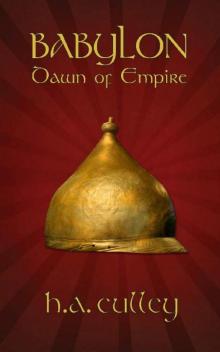 Dawn of Empire
Dawn of Empire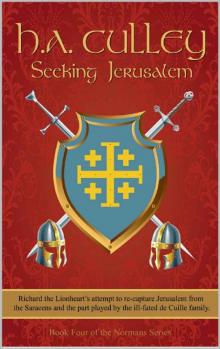 Seeking Jerusalem
Seeking Jerusalem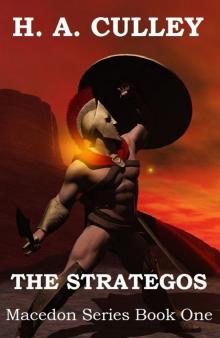 The Strategos
The Strategos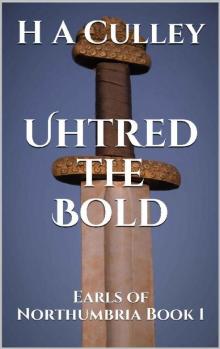 Uhtred the Bold
Uhtred the Bold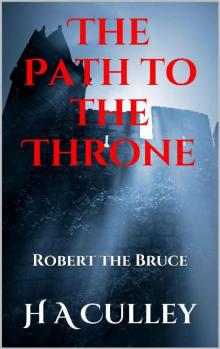 The Path to the Throne
The Path to the Throne The Bastard's Son
The Bastard's Son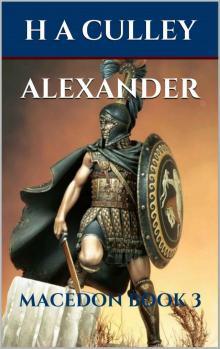 Alexander
Alexander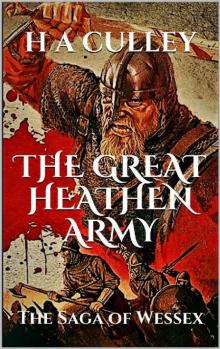 The Great Heathen Army
The Great Heathen Army The Sacred War
The Sacred War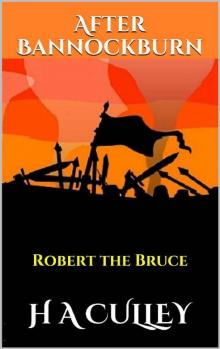 After Bannockburn
After Bannockburn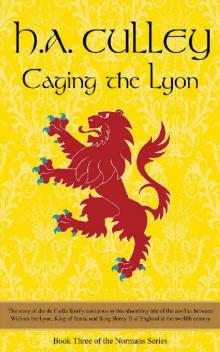 Caging the Lyon
Caging the Lyon The Bastard's Crown
The Bastard's Crown WHITEBLADE
WHITEBLADE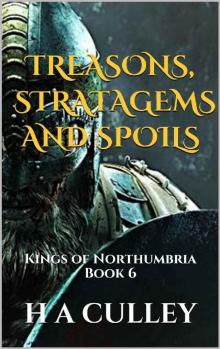 TREASONS, STRATAGEMS AND SPOILS: Kings of Northumbria Book 6
TREASONS, STRATAGEMS AND SPOILS: Kings of Northumbria Book 6 THE POWER AND THE GLORY: Kings of Northumbria Book 4
THE POWER AND THE GLORY: Kings of Northumbria Book 4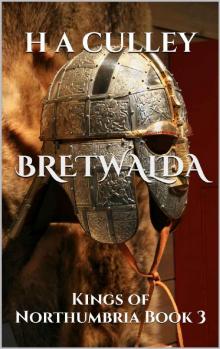 BRETWALDA: Kings of Northumbria Book 3
BRETWALDA: Kings of Northumbria Book 3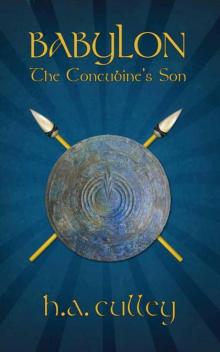 The Concubine's Son
The Concubine's Son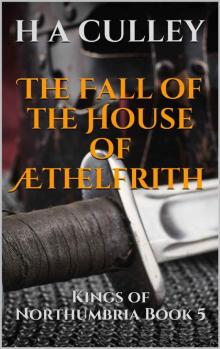 The Fall of the House of Æthelfrith: Kings of Northumbria Book 5
The Fall of the House of Æthelfrith: Kings of Northumbria Book 5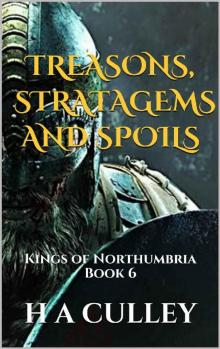 TREASONS, STRATAGEMS AND SPOILS
TREASONS, STRATAGEMS AND SPOILS THE POWER AND THE GLORY
THE POWER AND THE GLORY WARRIORS OF THE NORTH
WARRIORS OF THE NORTH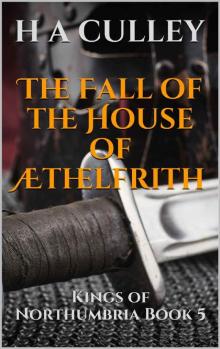 The Fall of the House of Æthelfrith
The Fall of the House of Æthelfrith WARRIORS OF THE NORTH: Kings of Northumbria Book 2
WARRIORS OF THE NORTH: Kings of Northumbria Book 2 WHITEBLADE: Kings of Northumbria Book 1
WHITEBLADE: Kings of Northumbria Book 1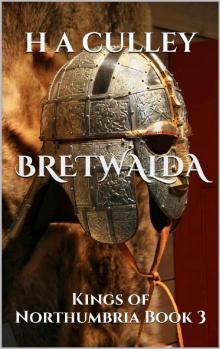 BRETWALDA
BRETWALDA